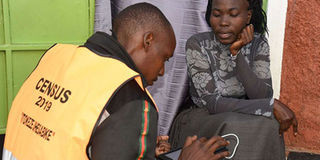Big question is, can we count on protection of our personal data?

Ms Barones Ouma, a resident of Shauri Estate in Uasin Gishu County, responds to census questions on August 25, 2019. Protecting data gathered from the exercise is paramount. PHOTO | JARED NYATAYA | NATION MEDIA GROUP
What you need to know:
- The big question is whether our data is safe, knowing the government’s growing penchant for excessive snooping on citizens or collecting and trading in our personal data.
- We know that this government is spectacularly deficient in explaining itself to the people and winning their trust and confidence.
I sacrificed my regular weekend excursion to the ‘stadium’ where men gather to watch football and other sports amidst serious discourse on matters of grave national importance; to stay up late into the night waiting for the national census enumerators. They never turned up.
I’m still waiting in my living room as I pen this, again having put on hold so many things I’d rather be doing.
It is a bit off-putting, however, to learn that instead of the national headcount being concluded on the night of August 24, it could go on for the better part of a week.
I doubt many will have the time or inclination to idle away waiting for census clerks, who may or may not turn up.
It is ironic that the fellows in charge are crowing that this is the first ever digital census in Kenya, yet it might be the slowest on record.
We seem to have perfected the unique capacity of using technology to complicate rather than simplify things, as witnessed with the last three general elections.
PLANNING
Anyway, I just want to be counted. Nobody can countenance the importance of a national census.
Although it is often seen as a simple headcount, it generates other vital demographic, economic and social data absolutely vital to development planning.
One big problem however is this peculiar Kenyan habit of politicising and generally throwing roadblocks in the way of every initiative.
I can bet my last coin that before the exercise is over, somebody will have gone to court seeking a halt order.
A first-time visitor listening in to the spirited discussion on WhatsApp and Facebook, marketplaces, bars, roadside congregations, women’s chamas, or anywhere else where we gather to gossip, politic and whine, would be forgiven for concluding that this is the first ever population census in Kenya.
The fact is that this country holds a proud record of a census every 10 years, without fail. The first census after independence was held in 1969, and following on that every year ending in the number 9.
LOW TRUST LEVEL
Why then are we talking as if the census is some strange and unprecedented exercise with all kinds of unknown motives and potential for dangerous consequences?
Because we are Kenyan. And also because we have been given good reason to deeply mistrust the authorities.
We know that this government is spectacularly deficient in explaining itself to the people and winning their trust and confidence.
On the census for example, the authorities have been unable to offer any cogent explanation for demanding national identity card or passport numbers, yet the law is clear that respondents are guaranteed anonymity and should not be asked questions that reveal their identity.
Some bureaucrat came up with the explanation that the identity card numbers would be expunged at time of data analysis, but that patent nonsense only raised more questions than answers.
DATA SECURITY
The big question is whether our data is safe, knowing the government’s growing penchant for excessive snooping on citizens or collecting and trading in our personal data.
These are not idle concerns. Remember Huduma Card and the Mastercard tie-in? How about the digital identity cards project and its relationship to the police surveillance system?
And we have also heard of late another scheme to enforce police access to private surveillance camera images, including the CCTV camera we might have in homes and offices.
Private enterprises working in identity and security systems are apparently being paid in kind, via access and commercial rights, to the data generated.
MIGRATION
As we worry about likely misuse of personal data, we should have expected our politicians to further muddy the waters.
They approached the census as a political exercise, publicly appealing to their ethnic groups to leave their usual places of abode and go to be counted ‘at home’.
What is ‘home’? I know a fellow who was born in Meru where his parents, who hailed from Murang’a, were working.
Along the way his parents migrated to Nyeri and made it their home. The fellow and his siblings, however, grew up and lived virtually all their lives in Nairobi.
He recently made a shift to Kajiado, just outside the capital city, where he now lives with a foot in each county.
He is not obeying a call from any politician who sees in him just a voter. Not especially from one who might be motivated to pollute the census with ghost numbers, as happened in most of the north-eastern region during the last national count.





